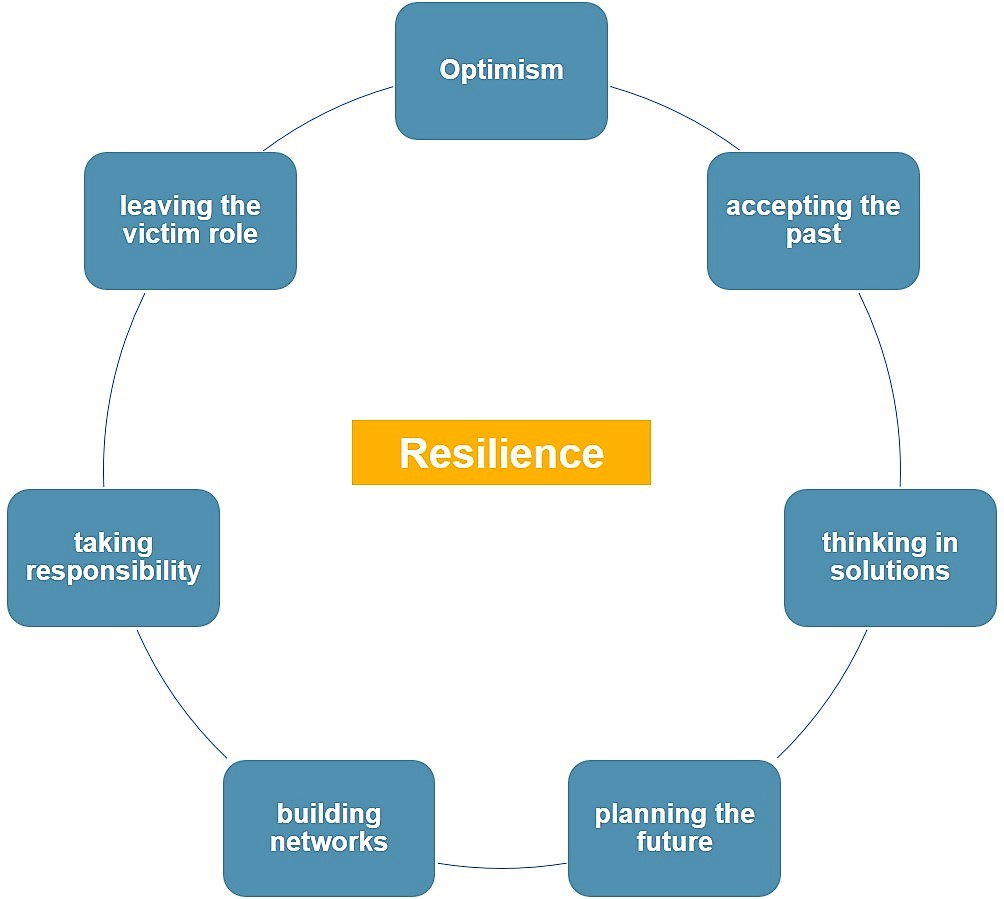When we think about fitness, we usually mean physical fitness. However, we are only really fit if we are also mentally fit – resilient – i.e. if we can cope with difficult life situations.
Different factors influence our “inner” resilience. We can strengthen and develop our resilience in the following areas of action:

We can train these areas of mental fitness just as we train our physical fitness! Here are some practical training suggestions that You can implement quickly:
I count on the best and look to the future with confidence.
Resilient people are optimistic. Optimism is the ability to see the positive aspects of a situation.
A first step: Put a few cent coins in your jacket pocket in the morning. Whenever you experience or see something beautiful during the day or something, you do very well, take one of the coins and put it into the other pocket. In the evening, do a “pocket tumble”. A day ends with a positive feeling.
Gone is gone. I accept unchangeable facts.
Resilient people accept the past.
A first step:
- Take a piece of paper in the evening.
- Write down what annoyed you that day and/or what didn’t work.
- Read what you have written down, and then tear up the piece of paper.
The day is over. You can no longer change it. Start the next day positively.
All dreams can come true if we dare to follow them.
Resilient people think in solutions. We can always think problem-focused, or we learn to look for solutions.
A first step: Allow yourself a crazy idea/solution for a task. Approach solutions playfully for once, without prohibitions on thinking. Maybe think, “What if I….” at first. Sometimes it also helps to put the problem aside and think about it again later.
I don’t ask, “who’s fault is it?” I ask, “how can I fix it?”.
Resilient people avoid the victim role. Things can always go wrong. Then, depending on our attitude, we look for others to blame, sink into self-pity and feel like victims. But we can also take responsibility, learn from the situation and do things better or at least differently next time.
A first step: Think of a recent situation that annoyed you. Don’t think about the other person, but about yourself. How did you react? What annoyed you about your reaction? How could you react better/differently next time?
Problems are challenges that I can overcome.
Resilient people take responsibility. When we achieve what we set out to do, we feel good. “I can do everything I set out to do”.
A first step: Remember a situation in which you succeeded particularly well in solving a task. Describe it for yourself. How did you go about it? Which of your skills did you use? Where could you use these skills for other tasks?
Things are better together. I can also trust others and build on their support.
Resilient people use their environment to solve tasks.
A first step:
- Think about which people are good for you.
- Write down their names.
- Maintain contact with these people (especially in times of Corona).
- Get in touch with at least one connection per day and make a note about this in your calendar.
I examine opportunities and risks before deciding on a path. I work towards a goal.
Resilient people plan their future.
A first step: Write seven wishes for the next week, each on a piece of paper. They should not be too far away and reachable in the first step. Pull a piece of paper out of the pile every morning. Consciously take 5 minutes to plan how you will go about making your wish come true. From this, our subconscious learns that wishes come true when we take the time for them, i.e. when we plan them (in).
On all fields of action:
- Write down your ideas and thoughts on this!
- Make your plans visible to yourself!
- Put your intentions into practice. Do them!
- Reflect on your approach and enjoy your successes!
- Learn from experience!
- Don’t give up!
- Repeat plans and ideas!
Train your Resilience: Are you interested in our e-learning or blended learning course to deal with this topic more intensively? Then email us to office@coverdale.at.


Recent Comments